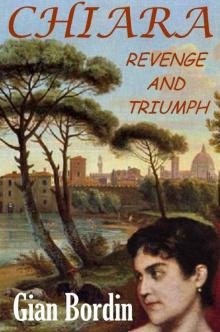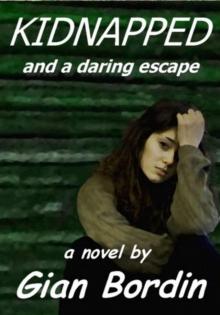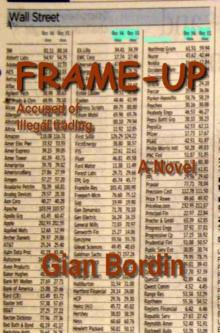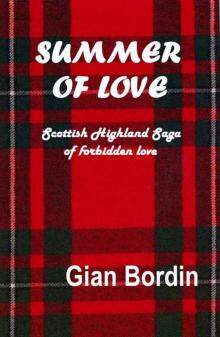- Home
- Gian Bordin
Summer of Love Page 2
Summer of Love Read online
Page 2
After two miles a glen opened to his right, rising gently beneath the round peak of Creag Gharbh. That must be their glen, went through his mind. He felt reluctant to enter right away and continued along the shore.
A small row boat plied the smooth surface of the lake. Its V-shaped wake drew silvery stripes through the reflections in the water. The lone occupant beached the boat about a mile further on, near a couple of houses on a small rise that overlooked the clachan of Ardeonaig, and unloaded a basket full of fish.
On the spur of the moment, Andrew rode down to the fisherman and bargained for three good-sized trout. As he hooked the fish to his saddle bag, he felt suddenly silly. They’d spoil before he got back to the castle, and the cook would just growl if he asked to have them prepared for his dinner. But then it dawned on him why he had bought them. They were a sort of peace offering to Mary MacGregor. Hopefully, the bottle of claret in his pouch might serve the same purpose for her husband. But why did he feel he had to make this gesture? He didn’t know them. He didn’t owe them anything. Was it simply because he was a Campbell from Argyle and they were MacGregors? … On strive with each other for hundreds of years? He did not know the answer. All he knew was that he had this vague urge to be on good terms with them and with their daughter. Was it Helen? He spoke the name softly. It sounded melodious. I’m being silly again, he chided himself silently.
Back on the road with his purchase, he retraced his steps. A creek rushed from the copse of oak hiding the entrance to the glen. At the edge of the wood he reined his horse.
Six stone cottages hugged the bottom of the steep slope rising from the glen, their reed-covered roofs under a carpet of moss and grass, their outside walls in bad need of a coat of lime. Seen from the hill above, they would look like little dirt mounds. In front and beyond the cottages, several narrow fields stretched for two hundred feet or so, stony dark brown earth freshly ploughed. Enough for roughly 50 bushels of grains and oats, he figured. That would feed about 25 people. Was Dougal’s group so small or did they need to buy grains to make up the shortfall?
A dozen Highland black cattle grazed in a stone-enclosed paddock just above the fields, full udders revealed under their shaggy coats. Farther up were goats and sheep, a few ponies, and more black cattle—no more than four score animals in all.
Two women knelt on flat rocks at the gurgling creek, washing clothes in a small pool. Each wore a single petticoat folded up and tucked into the girdle, exposing their white thighs. Four small children played by the creek. No men were in sight.
Suddenly, a dog barked, instantly joined by a second. When the women spotted the intruder they got up quickly and dropped the hem of their petticoats. Andrew recognized one as Mary MacGregor. She rushed back to the cottages, picking up the little boy clutching to her skirt.
A man emerged from the largest cottage, almost doubling over to get through the low opening. When he rose to his full height, he exuded a picture of raw strength. He wore full Highland garb, a dirk stuck in his belt, a heavy broad sword dangling on his right side. Dougal MacGregor—he must be left-handed, was Andrew’s fleeting thought. He guessed the man to be in his late forties. By then several other people, men, women, and children stood under the doorways of the other cottages, apprehensive and curious to know the reason for the disturbance.
Andrew kicked his mare lightly, and she resumed her steady gait.
The man remained motionless outside. Behind him, a young girl studied the visitor with an inquisitive frown. The same full red curly hair as ‘his Helen’, the same facial features, just less bold, more vulnerable. After a moment’s hesitation, she ran to meet her mother, taking the little boy off her.
Andrew dismounted some thirty feet in front of the group, the trout in his hand. Mary MacGregor’s eyes widened briefly in recognition, and for an instant he faltered in his steps under her searching gaze.
"This is a nice spring day, Mr. MacGregor." He chose to address him in Gaelic and use his real name.
Dougal MacGregor did not return the greeting right away, but scrutinized the young man thoughtfully. Then he said in a not unfriendly tone: "And what brings a Campbell lad onto my land?"
"Indeed, I am a Campbell, although it’s not my fault, sir," Andrew replied with a chuckle. "Andrew Campbell is my given name. I’m Mr. Graham’s new assistant, as he is much hindered by his gout nowadays."
"Came here to collect the rent?" A sharp edge had crept into his voice.
"In fact, Mr. Graham gave no such instructions. He wants me to reconnoiter the earl’s lands and make myself known to his tacksmen."
"I haven’t seen you before. You don’t come from around here?"
"No, sir. Inveraray is where I was born."
He always loathed to admit that he had grown up in the duke’s castle. It invariably caused raised eyebrows. Again he felt Mary MacGregor’s curious gaze on him. Blushing, he turned to her: "Mrs. MacGregor, I rode along the loch and couldn’t resist bargaining for these trout. They’ve been caught this very morning. But I now realize that they’ll spoil before I get back to Finlarig. May I offer them for your victuals?"
As she took the fish, a first smile crossed her stern face, giving a hint of her former beauty. "This is mighty kind of you. They’ll make a fine dinner. Will you join us?"
"Thank you, Mrs. MacGregor, with pleasure." Her eyes, the soft blue of forget-me-nots, reminded him of ‘his Helen’. Where was she?
"Yes, woman, you take the words out of my mouth," said her husband somewhat patronizingly. "Come into my house, young man! I will not hold it against you that you are a Campbell."
"I may be a Campbell by name, but I’m a Highlander first, sir."
Dougal raised his eyebrows. "And how’s that?"
"Aye, we Highlanders need to stick together and bury our quarrels, or else we will just be swallowed up piecemeal by the English and their lowland lackeys."
"Well said, lad, well said, but then blood runs thicker than water. There have been grave injustices done to us."
"I wish I could undo some, but that was before my time, sir."
A low fire crackled in the stone hearth under the wooden flue built against the partition which divided the house into two rooms, but left the roof space open, thereby offering heat to both parts. A young woman stirred the pot over the fire. Richly smelling wafts were rising slowly. She turned to face them. Andrew nodded in greetings and smiled. Her surprise quickly changed into an air of annoyance, and she walked swiftly past them to the door.
"Helen, lass, fetch cups for master Andrew here and me! He is Mr. Graham’s new apprentice."
Andrew’s heartbeat quickened briefly. Her name was Helen. How marvelous! It fitted her so well. He was rudely brought back when he heard her curt answer: "I know. That’s hardly a recommendation."
Brusquely, as if to emphasize her displeasure, she placed two cups on the wooden table and hurried out. Dougal MacGregor’s gaze followed her. "What’s got into her?" he muttered and then shouted after her: "And where’s the ale?"
There was no answer, nor did she come back. Andrew reached for his pouch and pulled out the bottle of claret. "Mr. MacGregor, I brought some claret along. May I share it with you?"
With a laugh the older man took the bottle and exclaimed: "Have you come acourting?"
Andrew blushed, but recovered quickly. "Why, sir? Have you a daughter to give away?"
"Not yet, lad, not yet." Nodding after Helen, he muttered: "She will be a hard nut to crack."
He gripped the partially removed cork with his teeth, pulled it out, and poured half a cup for each. Raising it toward Andrew, he exclaimed in English: "To your health, master Andrew!" He let the wine linger on his palate and, switching back to Gaelic, he added: "Not bad, … not bad at all. I just emptied my last bottle the other day."
The conversation turned to the weather, to the prospects for the coming season and the likely prices of the cattle at the Crieff drover market. Dougal expected to get just enough from the sale to make
up his arrears in rent, purchase additional oats for the winter, and buy other essentials, including a few bottles of claret.
While they talked, Mary MacGregor baked the trout, occasionally asking a question. Twice, she tried to change the conversation, probing into Andrew’s background. His answers remained evasive, giving away little, except that before joining Mr. Graham he had spent four years at the university in Edinburgh.
Helen only briefly returned to the room, helping her mother serve the food. She ignored him completely, as if he wasn’t there. But he did not mind. In fact, it gave him greater leisure to observe her, to imprint her face into his memory. It was her pronounced cheek bones, the high forehead, the big eyes, and the strong chin that imparted to her face such strength, such a bold cut. She was slender, but looked strong. Her bosom proudly swelled under her little jacket.
After dining on one of the trout, the talk turned to the clouds of the political storm gathering in the country, but particularly in the Highlands, threatening another rising of the Jacobites in support of Charles Edward Stuart’s quest to regain the crown of Scotland he considered rightfully his. Dougal MacGregor expounded his theory that, if such a rising occurred, surely this time most of the Highland clans, except for the Campbells, would unite to get rid of the English and help restore Scotland as a free nation once and for all. Only when he finished did he seem to remember that his visitor was a Campbell, and he added with a chuckle: "Yes, master Andrew, we may end up on opposite sides. But right now, let’s enjoy that excellent claret of yours."
* * *
Helen pricked her ears when she heard an unfamiliar voice. Visitors to their clachan still were a novelty—a welcome diversion from the daily drudgery. She quickly brushed down her jacket and petticoat, intent on going outside to still her curiosity, and stirred the broth once more. By then she heard her father enter the cottage, followed by another person. Turning, she recognized the factor’s new helper. In her initial surprise, she almost answered his smile. Annoyed that her face had betrayed her, she stormed out of the cottage, only to be called back to do her father’s bidding.
Why was he here? Had he come to see her? Again she felt those eyes searching hers, almost begging. She was not going to give him the satisfaction of staying. No, she would rather finish the washing her mother had started. But her thoughts remained with the young man. She suddenly regretted that she had not stayed to listen to their talk. It would have been worth it; fed her craving for news and knowledge for days to come.
After finishing her chores at the river, she lingered around outside the cottage. Only her father’s booming voice carried to her, while the young man’s was nothing more than an undistinguishable murmur. She purposely ignored him while helping her mother serve the two men, and left quickly, taking portions of trout to her siblings, wondering if he had brought the fish. What did he want? Had he really come to see her? No, it must have been on factor’s business. Hadn’t the old man asked her mother if she had something for him?
When she heard the two men get up from the table, she quickly busied herself with her little brother. She only stole a glance at him as he rode away. At the copse of oak he looked back and waived. Her pulse quickened. She kept herself from responding and slowly turned away. Maybe he had really come to see her, but she reminded herself that he was only a Campbell of Argyle.
2
Some four weeks later, Andrew returned from another of his visits to the earl’s tenants, up Glen Dochart’s way. As he dismounted in the yard of the castle, a familiar voice startled him.
"Look who’s here! … Andrew!"
He turned and faced the condescending grin of Francis McNabb.
"Hello, Francis. Taking a break from university? I thought you had at least another year to go."
"No, I quit. It was too boring. I don’t understand how you could slave over books day and night, reading all that gibberish. You know me. I needed a drink from time to time, … and a woman."
It’s more likely they kicked you out—flunking every seminar in your second year—all talk, no brain, mused Andrew’s silently, but his face betrayed nothing.
"I expected you back in Inveraray. What are you doing here?"
"I’m Mr. Graham’s assistant. You know his gout troubles him quite badly."
"Ah, that old miser. It’s high time he croaks. You lodge in the castle?"
"Yes."
"Well, we might see you around then."
With mixed feelings, Andrew watched him disappear. Then he called the stable hand: "Hey, Jamie, take care of my horse, will you? She needs a good rubbing down. I rode her quite hard."
"Aye, sir."
With a smile, Andrew tossed the bridle to the twelve-year-old ruddy lad and entered the castle through the servants’ entrance. He was not keen to meet up with Francis again right away. It would be early enough over dinner.
When Andrew entered the mess later that evening, boisterous laughter greeted him from the far end of the long table, where Francis and several young men were already heavily into the ale.
"Hey, Andrew. Join us!" shouted Francis and then, turning toward the kitchen, he called out: "Hurry Annie, bring a jug for master Andrew!"
No way to avoid him here, Andrew resigned himself and slid onto the bench next to the two officers of the castle guard, opposite Francis. They returned his nod politely.
Francis introduced him to John, his older brother, and James Campbell, Lord Glenorchy’s nephew. "Andrew and I were together at the university. He was one of those who lived in the library, and not because of the librarian’s daughters," he said with a goat-like snigger. Turning back to Andrew he added: "We’ve all come back to this forsaken place only today."
"Oh, I heard you’re working with the factor," said James, shaking Andrew’s hand.
John simply nodded in greeting and turned back to talk to one of the officers.
"You should be able to find a way to cook the books," James continued with a sly grin, "or doesn’t Graham trust you with the cash yet? Ha ha."
"No, he guards his money carefully."
"Oh, it isn’t his. It’s my uncle’s. But then I wouldn’t mind putting my hands on a small share of it myself."
"That would be pretty difficult. It’s all meticulously written down and accounted for."
"I see, you know already how the ledger is kept."
"I’m learning."
"Hey Andrew," interrupted Francis, leaning over the table, "any luck with the maids?" Straightening up again, he grinned knowingly to John and James: "I guess he’s the wrong fellow to ask."
John joined in the banter: "Why? Is he a monk?"
"You could say that," Francis answered with a laugh. "I doubt he ever had a woman in Edinburgh—at least not while I was there," and turning to Andrew, "am I right, Andrew?"
Here he goes. It didn’t take long. Hiding his annoyance, Andrew grinned: "None of your business. Not everybody needs to brag about all his so-called conquests."
"So-called? You know they were true. I must have half a dozen off-springs already."
Yes, half a dozen miserable lives, despised, and picked upon, went through Andrew’s mind. He knew first-hand. How often had he been reminded of being a bastard? How often had he cried into the darkness of the night when he was a small boy? Wishing for his own mother and for a real father, rather than being brought up by three or four servant women, admittedly kindly inclined toward him, and then saddled with the stern tutor, hired by Lady Campbell, his father’s mother, because she felt it was the family’s duty to provide him with a proper education in spite of his birth. But then it had allowed him to attend university.
It needed little for Andrew’s thoughts to drift back to his university years. He had been truly happy there. It had been a time of exploring the world, even if only second-hand through books. A time to discover his fascination with history, his love for literature, devouring not only the classical English poets and playwrights, like Shakespeare, but also the ancient Greek and Roman
philosophers. And there had been lots of fun with his young mathematics teacher, a scholar from Oxford, from whom he had picked up a perfect upper-class English accent that would fool anybody into mistaking him for the son of an English lord. Somehow, he had become a different person there, learning to trust himself, shedding his sense of inferiority. How he wished to be still there! A smile fleetingly crossed his face.
"Now, look at him. He’s again in the clouds. He doesn’t even hear us… Come, Andrew. You’re in bloody Finlarig Castle, not the university library."
Francis’ sneering laugh shook him from his daydream. He grinned somewhat sheepishly. The arrival of the food saved him from having to give an answer.
* * *
In spite of himself, Andrew fell in with the McNabb brothers and James Campbell. Francis did not easily take ‘no’ for an answer, and Andrew ran out of excuses. Besides, after a day’s work, he quite often did not feel like reading, and there was not much else to do. It started out when the three invaded his sanctuary in the library, where they found him engrossed in a book under the ample light of the twelve-candle chandelier. They quickly judged that in this cosy parlor, with its comfortable soft chairs, away from the traffic of the castle, they could have their drinking and smoking bouts perfectly undisturbed. Andrew discovered that James was actually an interesting fellow, a cut above the other two, well versed in logic and clever debate from his university days in Glasgow, and so he was willing to suffer the McNabb brothers.
Fortunately, the factor’s business took him away for two or three days most weeks. To Kenmore, Lochearnhead and Balquhidder, the refuge of Rob Roy’s sons, and occasionally even up Glen Dochart to Crianlarich. Most Sundays after church, he roamed on the slopes of Beinn Leabhain and Creag Gharbh in the hope of a chance encounter with Helen, but something kept him from riding directly into the MacGregor shielings. Once he thought he spotted her with her younger sister from the ridge above Lochan nan Geadas. But by the time he was down at the water, they were gone.

 Chiara – Revenge and Triumph
Chiara – Revenge and Triumph Kidnapped and a Daring Escape
Kidnapped and a Daring Escape Yuen-Mong's Revenge
Yuen-Mong's Revenge Frame-Up
Frame-Up Summer of Love
Summer of Love